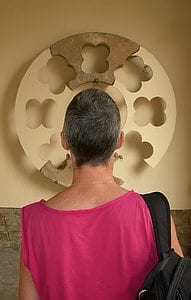
“Act your age.” What does that mean?!?
When said to a youngster, this simple phrase can be used as a reprimand, a polite way of shaming one out of some “childish” behavior. But once grown up, acting one’s age is frowned upon. Facelifts, tummy tucks, and hair dye are used to act an age left far behind. The threat of death seems to motivate people to believe, “It’s safer to think young than old.”
At age ninety-two my grandfather still visited at least two new places every year. He never believed he was too old to learn or experience something for the first time. I admire how engaged he stayed in life. I want to do the same. Walking the Camino challenged my belief that I will have to deny my age to do so. I learned the hard way that pretending to be younger than I am is unhelpful. In reality, doing so injured me in many different ways.
Before I left for the Camino, I celebrated my forty-eighth birthday with joy. Physical age had little to do with how I understood myself. In my mind I didn’t imagine myself being forty-eight years old; I was twenty-four years young. That twenty-four-year-old was agile, energetic, strong, and nearly invincible. She was sure that on a pilgrimage she would have no trouble walking the same distances at the same pace as her twenty-year-old son. She imagined that her body would heal almost instantly when injured. She thought that a good night’s rest would restore her, even if she had been walking fifteen miles a day for several weeks.
This perimenopausal body I inhabit held quite a different reality. The problem is that I having been in denial about my aging body for so long, I haven’t paid attention to what it means to inhabit a female body nearing fifty. The realities that my legs took a year to heal from the stress of the pilgrimage, my body needed extra hours of sleep every night for two months after completing the five hundred mile walk, and that my stamina still isn’t the same as before I left surprises and troubles me.
I value and appreciate my body. I have been committed to taking good care of it, attending to its needs for nutritious food, lots of pure water, and regular activity. I know that there are no guarantees about health, but I also believe that paying attention to one’s physical well-being is a worthwhile investment.
When I began to practice yoga regularly about ten years ago, I noticed for the first time that my body had changed. I could still stand on my head and hands, but bending backward was not nearly as easy as when I had been younger. Actually, any kind of bending wasn’t as enjoyable as it had once been. I could touch my toes, but I didn’t twist as far in any direction as I once had. Every time I went to class or got on my yoga mat I realized that my body was not nearly as elastic as when I first tried out yoga poses at age eighteen. I came to understand yoga as an exercise in humility as much as a practice in flexibility. My body told the truth about my aging. I had to acknowledge this, but I didn’t want to believe that my self-understanding needed to shift. I was afraid of getting older, afraid of thinking of myself as an aging woman. I was fearful that the reality of acting my age would diminish me in some vital way.
Denial is a powerful force. More powerful than yoga, that’s for sure! Even though I continued to be humbled in every yoga class, I also continued to believe the fantasy that my body was no different than it had been in my mid-twenties. This conviction was designed to contribute to my overall well-being. “If you think young and act young, you’ll stay young. (You won’t die then.)” This seemed reasonable—until it was tested by the reality of a long-distance walking pilgrimage.
We all have idiosyncrasies. One of mine is an immense ability to ignore differences. For instance, in my mind, all people are the same height. One of the benefits of this is that I am able to find common ground with almost anyone. However, it can be difficult to perceive important distinctions. Once we started walking the Camino, I was very shocked that my natural pace was significantly slower than that of my sons; my mind had told me that they would be the same. It would not have been possible for me to keep up with these young men even if I had tried my hardest. After years of teaching people to walk labyrinths at their own pace, I did not need to be reminded that trying to mimic another’s speed is unwise for both physical and psychological reasons. Knowing this did not help soothe my stunned and wounded pride. Acting old, i.e. walking slow, was clearly less valuable in my mind than acting young, i.e. walking more quickly. I judged my body’s need to pace itself as a deficiency. Fortunately, I did not push myself to go faster, but I punished myself mentally for acting my age. No wonder I felt hesitant and apologetic every time I told my sons, “I need to slow down a bit.” Had I known myself better, or studied reality a bit more astutely, I could have anticipated our differences. Being more realistic would have allowed us to prepare for the reality of journeying together better.
Being present to the experience of the moment is very important to me. Learning how to stay present to others and myself has been a priority; I’ve worked hard to learn how to do this as fully as possible. Walking the Camino showed me that as present as I was mentally, emotionally, and spiritually, I was never fully present physically. How could I be when I was “there” as someone I had been half a lifetime ago?! The myth of youthful thinking had taken me to la-la land. I had been very happy there. As I surveyed the landscape from the new perspective of understanding, all I wanted to do was find my way back to reality, the reality of my body-truth.
At age forty-nine I need to accept:
- Pacing myself helps my body to be able to function at its best. If I push now, I will pay later by being more tired and having less stamina than if I hadn’t. If I keep a steady pace, I will feel better at the end. I may be able to go further as well.
- Rest is crucial. I benefit from breaks. After physical activity, my body requires stillness to regain its strength.
- Bodily stress is cumulative. More time is needed for renewal than when I was younger. The greater the stress, the greater the recovery time. Getting extra sleep aids my body’s capacity for healing.
- I can hurt myself if I am ignorant about the way my body functions. Training, staying hydrated, paying attention to the needs my body is communicating are valuable, but they may not be enough to prevent injury. The damage I did to my anterior tibias as I climbed up and down mountains was something that taught me that the more I learn about my body, the better care I can take of myself. For seven months I walked at least an hour a day in preparation for the pilgrimage, I did practice walks with my pack the last month, I even incorporated longer training (up to eight-hour walks) into my regime, but I didn’t think about how training in the flat mid-west would not be able to prepare me for mountainous terrain. I would add some weight training for my leg muscles next time.
- My body will help me know how to help it heal if I pay attention. Along the Camino, I found or was given rocks. I didn’t want to add their weight to my backpack, so I taped them to my walking stick. One day I noticed that I had attached a piece of quartz at the height of my leg pain. I decided to find a larger piece of quartz and tape it to my injured shin to see if it would help. I noticed that the swelling decreased after it had been on for a couple of hours. Later I discovered that quartz is understood to have healing properties. My body had already understood and communicated this.
- Supporting my body’s ability to restore itself is a way that I can show myself kindness. Laying on my back and putting my legs up the wall after a day of walking was a simple act, but one that made a huge difference in terms of how I felt later. Other easy ways to show care to my body include using essential oils and getting enough rest.
- Paying attention to the realities of body mechanics is helpful. For instance, if I don’t want to become stiff, I need to stretch.
- Physical exhaustion makes it virtually impossible to engage in meaningful relationships. Taking a nap before trying to have a significant conversation is a good idea when I am worn out. Praying was more satisfying after a rest period.
- I need to pay attention to my physical capabilities and limits. I tend to be unrealistic about how much I can reasonably do.
These are some of the many lessons my body unequivocally communicated as I journeyed on the Camino. What I learned would have applied earlier in my life, but it’s also true that when one is younger, the body seems to be more forgiving. My body-teacher found in me a very perplexed but attentive student.
I am still wondering what it means to act my age. I am leery of any thinking patterns that would limit my ability to engage in life fully. I keep reminding myself that imagining myself as younger prevents me from experiencing the truth of this moment, this phase of my life. I want to know myself, my body-self. I want to be present to the truth of my life now. As denial and false thinking fade, I am expecting to meet myself even more fully. Acting my age may be an incredible gift, but it takes a lot of courage. Especially as I am trying it on, trying to commit myself to it.
Do not copy any part of this copyrighted essay without permission from Jill.
Photo ©Timothy Charles Geoffrion
